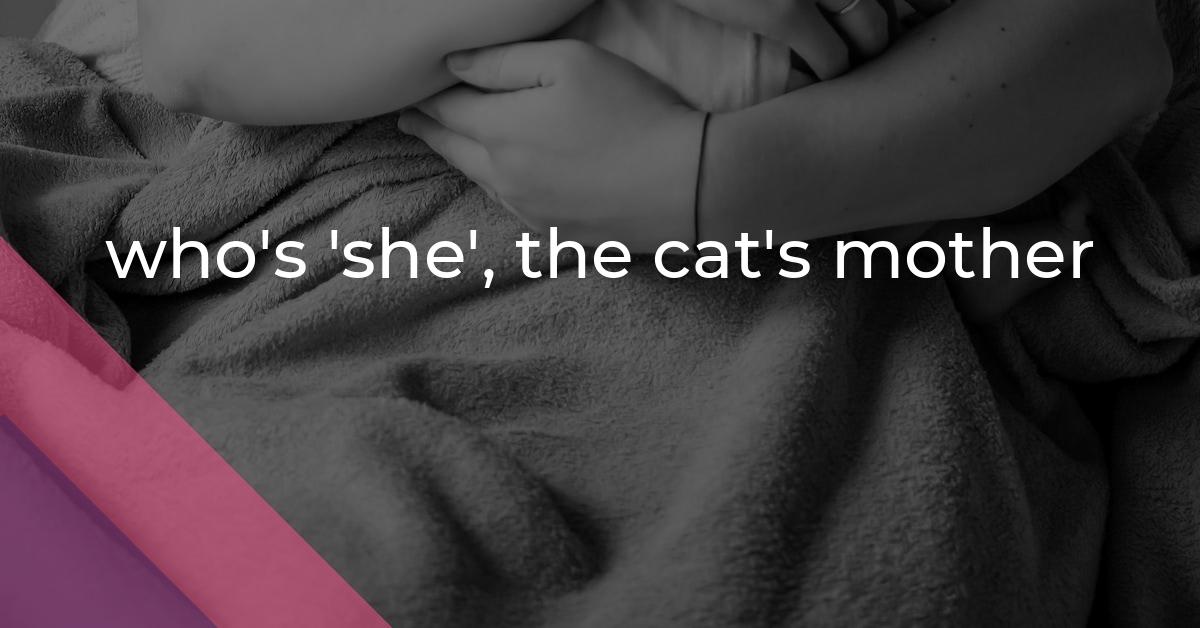who’s ‘she’, the cat’s mother: Idiom Meaning and Origin
What does ‘who's 'she', the cat's mother’ mean?
The idiom "who's 'she', the cat's mother" is a dismissive phrase used to scold someone for referring to a woman as "she" instead of using her name. It conveys the importance of addressing people by their proper names rather than using generic terms.

Idiom Explorer
The idiom "you gals" is a casual way of addressing a group of women or girls. It is often used to refer to a friendly or familiar group of females.
The idiom "who wants to know" is used to show indifference or annoyance towards someone who is prying or asking for unnecessary information.
The idiom "who's who" refers to a select group of individuals who are considered the most important or influential in a particular field or community.
The idiom "who shot John" is a colloquial expression used to refer to a chaotic or confusing situation. It suggests a scenario where there is a lot of noise or commotion, making it difficult to determine who is responsible for the chaos.
The idiom "whole shebang" means everything or the entirety of something. It is often used when referring to a complete package, group, or set of things.
The idiom "who are you telling" is used to acknowledge someone's statement by expressing agreement or understanding of the information they have shared.
The idiom "white sheep" refers to a person in a family or group who behaves or is considered as morally superior or respectable compared to other members. It highlights the contrast between the person's behavior and that of their relatives or peers.
The idiom "when it's at home" is used to express that someone struggles to explain or describe something in simple terms or lacks the knowledge or expertise in a particular subject.
The idiom "what someone said" refers to the exact words or statements expressed by a person. It emphasizes the importance of accurately conveying someone's speech or quoting them directly.
Hidden Meaning of 'She'
Who's 'she', the cat's mother is an idiom used in British English to scold someone, typically a child, who uses the pronoun "she" instead of using a name when referring to another person. The idiom is often used by adults to correct behavior or remind a child to use proper manners and show respect. It originated in the early 20th century and is still used today.
The exact origin of the idiom is unclear, but it is thought to have derived from the expression "who's 'she' when she's at home?". This earlier expression was used to question the importance or significance of someone or something. Over time, the expression evolved and became commonly used to correct language usage, especially among children. Adding "the cat's mother" to the idiom brings a playful element to the scolding and emphasizes the importance of using proper language and manners.
The idiom is typically used in informal situations, such as within families or close social circles, and is not commonly used in formal or professional settings. Its scolding tone suggests a desire for clear communication and respect for others, especially when referring to individuals by name or appropriate pronouns.
It's worth noting that the idiom may not be widely recognized or used outside of British English. While other English-speaking countries may have similar expressions to correct language usage, the specific phrase "who's 'she', the cat's mother" may not be as familiar or commonly used.
In addition to "who's 'she', the cat's mother," there are other related idioms that convey similar ideas. One such idiom is "and his mother." This phrase is used to emphasize the point someone is making, often in a dismissive or sarcastic way. For example, if someone says, "John thinks he's the smartest person in the room and his mother," they are implying that John's mother would agree with him, but it doesn't make his opinion any more valid or important. This idiom highlights the idea that someone's mother is not an authority figure or a source of validation for their opinions.
Another related idiom is "mother hen." This phrase refers to someone who is overly protective or caring towards others. It is often used to describe a person who constantly fusses over others and tries to take care of their every need. For example, if someone says, "Janet is such a mother hen, always making sure everyone has enough to eat," they are implying that Janet is always looking out for others and making sure they are well taken care of. This idiom conveys the idea of someone being nurturing and attentive, like a mother hen with her chicks.
Lastly, the idiom "cat's meow" is also related to "who's 'she', the cat's mother." This phrase is used to describe something or someone who is highly admired or considered to be excellent. It is often used in a playful or sarcastic way to express enthusiasm or approval. For example, if someone says, "That new car is the cat's meow," they are saying that the car is exceptional and highly desirable. This idiom conveys the idea of something being considered the best or most impressive, like a cat's meow catching everyone's attention.
"who's 'she', the cat's mother" is an idiom used in British English to scold someone for not using a proper name when referring to an individual. The origins of the idiom are uncertain, but it has evolved from an expression questioning the significance of someone or something. The idiom emphasizes the importance of using proper language and manners, particularly when referring to individuals by name or appropriate pronouns. While it may be specific to British English and informal contexts, it continues to be used as a reminder of the importance of respectful communication. In addition, related idioms such as "and his mother," "mother hen," and "cat's meow" convey similar ideas and further enrich the English language.
Example usage
Examples of how the idiom "who's 'she', the cat's mother" can be used in a sentence:
- When the child asked, "Who's 'she', the cat's mother?" the teacher reminded them to use proper manners and say "excuse me."
- "Who's 'she', the cat's mother?" exclaimed John, irritated by his friend's constant interrupting during their conversation.
- As Sarah tried to gossip about someone, her friend replied with a playful tone, "Who's 'she', the cat's mother? Mind your own business."
More "Idioms" idioms



